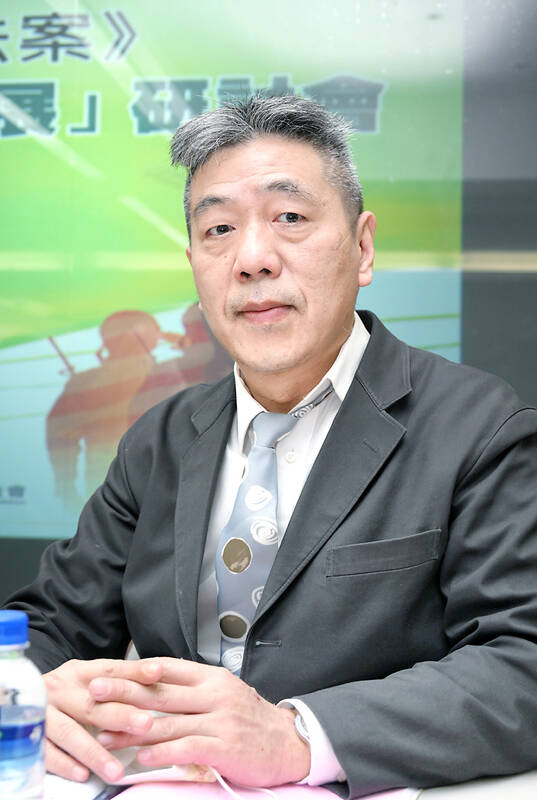The military backs the six defense-related technologies listed by the government as being among Taiwan’s 22 key core technologies to face stringent controls, due to national security reasons, the Ministry of National Defense said on Tuesday.
The six defense-related technologies include military-grade carbon fiber composite; carbon/carbon composite ablation materials; and interference rejection identification friend or foe (IFF) system technologies, the ministry said.
They also include military-grade technologies of microwave/infrared/multi-mode seeker, active phased array radar, and ramjet, a form of air-breathing jet engine that uses the forward motion of the engine to take in air for combustion that produces jet thrust, it said.

Photo: Fang Pin-chao, Taipei Times
The six technologies made the list according to recommendations by the ministry’s top research unit, the Chungshan Institute of Science and Technology (CSIST), to safeguard national security, it said in a statement.
The CSIST suggested the technologies based on two criteria, the ministry said.
First, Taiwan has an advantage in domestically developing or building those technologies, and second that it was urgent that they be put under government protection, the ministry said.
Institute for National Defense and Security Research fellow Su Tzu-yun (蘇紫雲) said the seeker technologies are particularly important.
The military-grade microwave/infrared/multi-mode seeker technology can enhance the ability of rocket and missile launch platform sensors to better identify and lock in enemy targets, including stealth aircraft, with the technology also used by fighter jets, uncrewed aerial vehicles and warships, he said.
Multi-mode seekers are being deployed for all kinds of rocket launchers, including the indigenous Hsiung Feng III supersonic anti-ship missile, Su said.
Beyond the benefits for the nation’s defense industry, the development of these key technologies can also support civilian purposes, such as applying the use of advanced infrared technology to autonomous vehicles, he said.
The six defense technologies were among 22 core technologies listed by the National Science and Technology Council (NSTC) to be under heightened controls to prevent technology leaks and bolster industrial competitiveness.
The 22 technologies cover five industries: defense, aerospace, agriculture, semiconductors and information and communications technology, the NSTC said.
“Key technologies” refer to technologies that, if exported to China, Macau, Hong Kong or “external hostile forces,” would significantly harm national security, industrial competitiveness, or economic development, the NSTC said, citing the National Security Act (國家安全法).
Those found obtaining trade secrets related to national core key technologies by way of “theft, embezzlement, fraud, coercion, unauthorized reproduction, or other improper methods, or using and disclosing them after obtaining them,” may face up to 12 years in prison and a fine of up to NT$100 million (US$3.17 million), as stipulated in the act.
SEE IC ON PAGE 12

Chinese Nationalist Party (KMT) Chairman Eric Chu (朱立倫), spokeswoman Yang Chih-yu (楊智伃) and Legislator Hsieh Lung-chieh (謝龍介) would be summoned by police for questioning for leading an illegal assembly on Thursday evening last week, Minister of the Interior Liu Shyh-fang (劉世芳) said today. The three KMT officials led an assembly outside the Taipei City Prosecutors’ Office, a restricted area where public assembly is not allowed, protesting the questioning of several KMT staff and searches of KMT headquarters and offices in a recall petition forgery case. Chu, Yang and Hsieh are all suspected of contravening the Assembly and Parade Act (集會遊行法) by holding

PRAISE: Japanese visitor Takashi Kubota said the Taiwanese temple architecture images showcased in the AI Art Gallery were the most impressive displays he saw Taiwan does not have an official pavilion at the World Expo in Osaka, Japan, because of its diplomatic predicament, but the government-backed Tech World pavilion is drawing interest with its unique recreations of works by Taiwanese artists. The pavilion features an artificial intelligence (AI)-based art gallery showcasing works of famous Taiwanese artists from the Japanese colonial period using innovative technologies. Among its main simulated displays are Eastern gouache paintings by Chen Chin (陳進), Lin Yu-shan (林玉山) and Kuo Hsueh-hu (郭雪湖), who were the three young Taiwanese painters selected for the East Asian Painting exhibition in 1927. Gouache is a water-based

Taiwan would welcome the return of Honduras as a diplomatic ally if its next president decides to make such a move, Minister of Foreign Affairs Lin Chia-lung (林佳龍) said yesterday. “Of course, we would welcome Honduras if they want to restore diplomatic ties with Taiwan after their elections,” Lin said at a meeting of the legislature’s Foreign Affairs and National Defense Committee, when asked to comment on statements made by two of the three Honduran presidential candidates during the presidential campaign in the Central American country. Taiwan is paying close attention to the region as a whole in the wake of a

OFF-TARGET: More than 30,000 participants were expected to take part in the Games next month, but only 6,550 foreign and 19,400 Taiwanese athletes have registered Taipei city councilors yesterday blasted the organizers of next month’s World Masters Games over sudden timetable and venue changes, which they said have caused thousands of participants to back out of the international sporting event, among other organizational issues. They also cited visa delays and political interference by China as reasons many foreign athletes are requesting refunds for the event, to be held from May 17 to 30. Jointly organized by the Taipei and New Taipei City governments, the games have been rocked by numerous controversies since preparations began in 2020. Taipei City Councilor Lin Yen-feng (林延鳳) said yesterday that new measures by